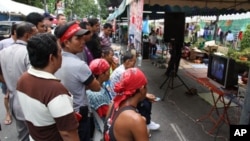In Thailand efforts to end anti-government protests in Bangkok have stalled. The protesters are not satisfied with the way government officials are proceeding with an investigation into a deadly clash with security forces.
Thousands of anti-government protesters remain camped in a Bangkok commercial district, and it is not clear when they will go home.
The so-called red shirt protesters are unhappy Deputy Prime Minister Suthep Thaungsuban reported to Justice Ministry authorities to answer questions about a clash between security forces and protesters on April 10.
Suthep was in charge of security operations when more than 20 people died in a failed attempt to disperse the protesters.
The red shirts demand that Suthep and Prime Minister Abhisit Vejjajiva be investigated for their roles in the crackdown. Mr. Abhisit says he will meet with Justice Ministry officials once cleared to do so by the Thailand Parliament.
But protest leader Weng Tojirakarn says the rally will end only when Suthep turns himself in to the police.
The protesters say the Justice Ministry's Department of Special Investigations favors the government. The police, however, are seen as being more favorable to the red shirts.
"We would like the government to be put or go into the judicial system and the real judicial system not the conflict of interest judiciary system," said Weng. "So if you present yourself to DSI I think it not going to bring a normal or justice judicial system to be in order."
Prime Minister Abhisit has proposed a reconciliation plan that includes elections in November, constitutional and electoral reforms and economic development. The protesters have in principle agreed to the plan.
Government spokesman Panitan Wattayanagorn says the protesters should realize there is there is public support for reconciliation.
"The ending of the protest is the wish of the Thai people - the majority of the Thai people - and I think the majority of the public is waiting and wanting the red shirts to end their demonstration and begin working on the objectives - the five objectives in the reconciliation proposal," he said.
Since early April protesters have occupied a prime commercial area of Bangkok paralyzing business in the area.
The protesters include poor rural and urban workers, as well as left-wing activists, democracy advocates and supporters of former prime minister Thaksin Shinawatra. He was removed in a coup in 2006, despite winning election twice.
Uncertainties Prevail Over Thailand Protests




